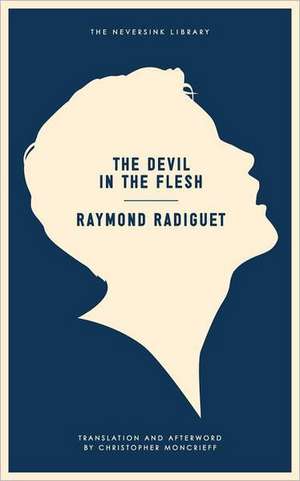The Devil in the Flesh: Neversink
Autor Raymond Radiguet Traducere de Christopher Moncrieffen Limba Engleză Paperback – 29 feb 2012
Set in Paris during the First World War, it tells the story of Francois, the 16-year-old narrator, who falls in love with Marthe, an older, married woman whose husband is off fighting at the front. What seems to begin as a charming tale of puppy love quickly darkens, and they launch into a steamy affair. In the tense environment of the wartime city, their love takes on a desperation transcending their youthfulness.
And as the badly-kept secret of their relationship unfolds, scandal descends, leading the story to a final, startling conclusion—and causing the book itself to become a scandal when it was first published in 1923, just before the author's death at the age of 20.
Preț: 78.55 lei
Nou
Puncte Express: 118
Preț estimativ în valută:
15.03€ • 16.07$ • 12.53£
15.03€ • 16.07$ • 12.53£
Carte indisponibilă temporar
Doresc să fiu notificat când acest titlu va fi disponibil:
Se trimite...
Preluare comenzi: 021 569.72.76
Specificații
ISBN-13: 9781612190563
ISBN-10: 1612190561
Pagini: 128
Dimensiuni: 129 x 203 x 9 mm
Greutate: 0.16 kg
Editura: Melville House Books
Seria Neversink
ISBN-10: 1612190561
Pagini: 128
Dimensiuni: 129 x 203 x 9 mm
Greutate: 0.16 kg
Editura: Melville House Books
Seria Neversink
Notă biografică
RAYMOND RADIGUET was born in 1903 in Saint-Maur, a small town outside Paris. He was the son of a cartoonist, but little else is known about his childhood until, at age 16, he dropped out of school after an affair with the wife of a soldier off fighting in the first World War, to go to Paris. Once there he quickly began writing for the magazine Sic, alongside writers such as Louis Aragon and Andre Breton, and he befriended many notable Modernists, including Pablo Picasso and Jean Cocteau. Despite his age, he also quickly developed a reputation for fast living; Ernest Hemingway would later accuse him of sleeping with Cocteau, among others, to advance his career. At the age of 18, after writing a collection of poems that would only be published posthumously, Les joues en feu, Radiguet moved to a fishing village near Toulon to work on the novel that would become his masterpiece, The Devil in the Flesh, which was based on his high school affair. Cocteau would later claim that he’d had to lock Radiguet in his hotel room to keep him from drinking binges rather than writing. The author’s youth and the scandalous story made the book a sensation, but Radiguet did not have long to enjoy his fame. Less than a year later, shortly after taking a trip with Cocteau to the country to finish a second novel, Le Bal du comte d’Orgel, Radiguet died of typhoid fever at age 20. Composer Francis Poulenc said of his death, “For two days I was unable to do anything, I was so stunned.”
CHRISTOPHER MONCRIEFF is one of the world’s premier French translators. He has translated the work of Gustave Flau- bert, Victor Hugo, and numerous other French masters.
CHRISTOPHER MONCRIEFF is one of the world’s premier French translators. He has translated the work of Gustave Flau- bert, Victor Hugo, and numerous other French masters.
Recenzii
“A triumph of the poetic intelligence: a masterpiece.”
—New Statesman
“Christopher Moncrieff ’s new translation carries Radiguet’s frank, staccato prose well. The confessional honesty of the language is what makes the book both shocking and sad.”
—Times Literary Supplement
“The Devil in the Flesh is unretouched and seems shocking, but nothing so resembles cynicism as clairvoyance. No adolescent be- fore Radiguet has delivered to us the secret of that age: we have all falsified it.” —Francois Mauriac
“Although Radiguet was so young, he had managed to zone in on the perversity of human love with an accuracy which anticipates, or is in parallel development with, Freud. . . . His insights compel us to keep reading, in the unpleasant knowledge that we may learn something, possibly even about ourselves. . . . One of the measures of the book’s brilliance is that its morality, or its amorality, is not clear-cut.” —The Guardian
“A masterpiece of promise.” —Jean Cocteau
—New Statesman
“Christopher Moncrieff ’s new translation carries Radiguet’s frank, staccato prose well. The confessional honesty of the language is what makes the book both shocking and sad.”
—Times Literary Supplement
“The Devil in the Flesh is unretouched and seems shocking, but nothing so resembles cynicism as clairvoyance. No adolescent be- fore Radiguet has delivered to us the secret of that age: we have all falsified it.” —Francois Mauriac
“Although Radiguet was so young, he had managed to zone in on the perversity of human love with an accuracy which anticipates, or is in parallel development with, Freud. . . . His insights compel us to keep reading, in the unpleasant knowledge that we may learn something, possibly even about ourselves. . . . One of the measures of the book’s brilliance is that its morality, or its amorality, is not clear-cut.” —The Guardian
“A masterpiece of promise.” —Jean Cocteau






